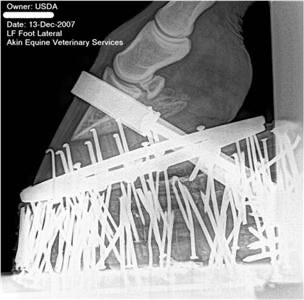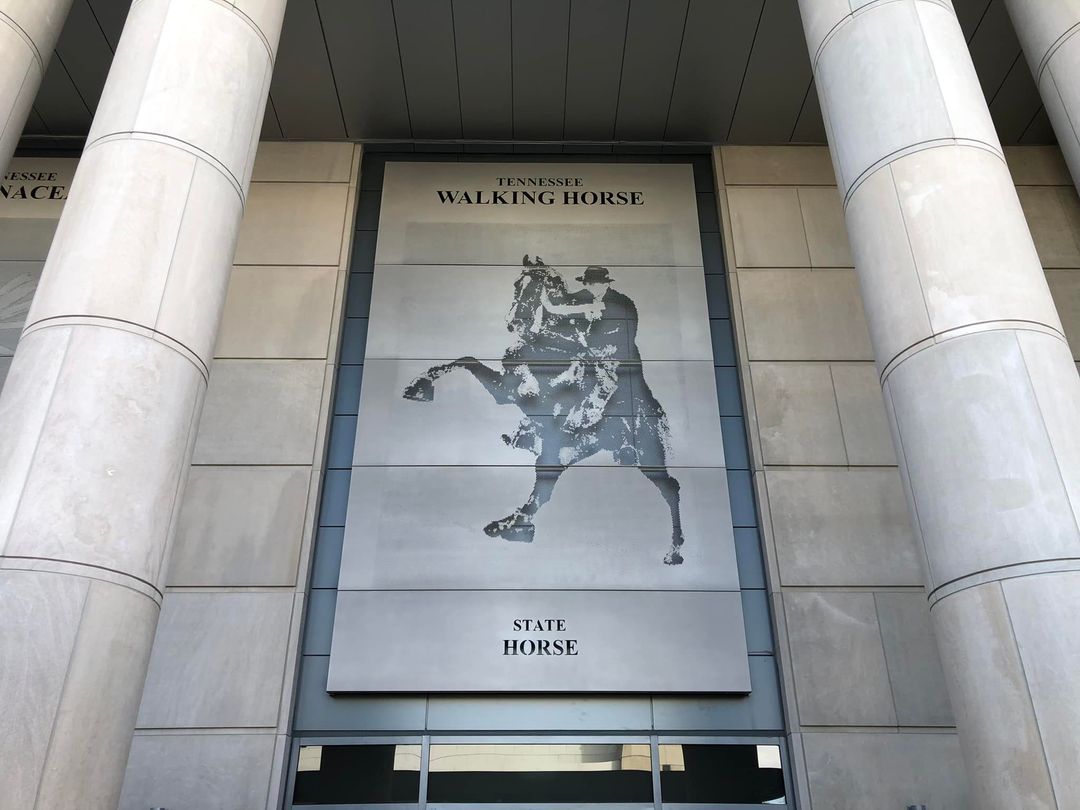An enormous engraving on a new state building glorifies animal abuse, according to an animal advocacy group.
The Washington, D.C.-based Animal Wellness Action (AWA) said the Tennessee Walking Horse engraving on the side of the new State Archive Building in Nashville went largely unnoticed until locals contacted the group.
The image shows a horse with one hoof raised high in the characteristic “big lick” gait of the animals. Walking horses have a natural, smooth gait but to get their hooves up higher in a competition, trainers have “sored” the horses, intentionally harming the animals’ hooves and ankles. To do this, trainers will pour irritating chemicals like diesel fuel or mustard oil on the horse’s ankles, fit them with high-stacked shoes, link heavy chains around their ankles, drive nails into their hooves, or train them with trimmed hooves, exposing sensitive tissue.

“It’s shameful to see the state of Tennessee double down in support of the pain-based ‘big lick’ gait that’s now displayed on the walls of its new archives building,” said Marty Irby, executive director at AWA and a past president of the Tennessee Walking Horse Breeders’ & Exhibitors’ Association. “This exaggerated movement of the horses’ front legs is induced by driving nails into the sensitive part of the horses’ feet or by applying burning chemicals onto their pasterns and then putting giant, stacked shoes and ankle chains on their feet. This image should be archived only as a historical footnote about this animal cruelty that runs rampant in the state.”
In 1970, Congress declared the soring of horses to be cruel and inhumane with the passage of the Horse Protection Act. The law prohibits anyone from entering a sored horse into a show, sale, auction, or exhibition. Breaking the law comes with a jail sentence of up to two years and a fine up to $5,000.
The law also disqualifies any trainer and horse from a competition if the horse is found to be sored. Inspectors found 36 violations of the Horse Protection Act in preliminary inspections at Shelbyville, Tennessee’s annual National Walking Horse Trainers’ Show, one of the largest horse shows in the world. All horses were cleared, however, on follow-up inspections.
Through the Horse Protection Act, the walking-horse industry polices itself. Irby says enforcement of the law is “intermittent at best with just a handful” of criminal prosecutions. An investigation by the Animal Wellness Institute (AWI) found 956 warnings for soring violations in 2016. In 2018, there were none and since then the USDA has issued only one complaint and not conducted any investigation, according to the AWI report. Two years later, that number dropped to zero. Since 2018, the USDA has issued only one administrative complaint related to soring and has not conducted any investigations, according to the AWI.
The AWA and AWI are pushing lawmakers to approve the Prevent All Soring Tactics (PAST) Act. It would ban the use of stacked shoes and ankle chains in competitions, get rid of the walking horse industry’s self-monitoring program, and increase penalties for those found scoring horses.
AWA has been pushing the PAST Act since 2012. The legislation passed the federal House in 2019. AWA said opposition from senators from Tennessee and Kentucky killed the bill in the Senate that year. But the legislation was reintroduced in the Senate this year.
“Though the Horse Protection Act was signed into law more than 50 years ago to protect horses from painful soring, this abuse continues unabated,” said Cathy Liss, president of Animal Wellness Institute.
To some, showing the walking horse in stride on the side of a state building is a step in the wrong direction.
“Placing the ‘big lick’ on the façade of the new state archive building is a brazen and embarrassing display of animal cruelty, especially when the University of Tennessee and other state institutions don’t want anything to do with this kind of malice toward horses,” said Wayne Pacelle, president of the Center for a Humane Economy.
